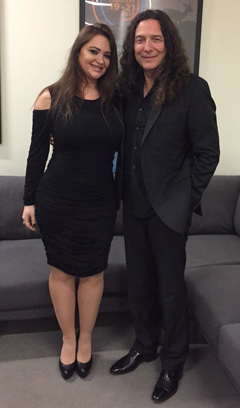 .
.The color of his face reminds you of children playing freely under the sun; his long and curly black hair reminds you of free horses running in the wild, while his deep voice carries you straight to the magic world of his gypsy origins. When you are in his presence, his charisma and powerful appearance gives you the chills.
As part of Abu Dhabi Festival’s strategic partnership with NYU, the festival hosted five-time Grammy award winner Jose Fernandez Torres, known as Tomatito. He has been one of the most talented artists who helped in the evolution of the flamenco guitar. He is considered to be one of the greatest flamenco guitarists of all time.
Born in Almeria in 1958 into a family of great Flamenco guitarists, he began his musical career aged 12, performing in renowned flamenco clubs. He recorded six solo albums and has performed at international venues - from the Palais des Beaux-Arts in Brussels to London’s Royal Albert Hall. Tomatito has collaborated with many other great artists such as Enrique Morente, La Susi and Jose Menese. His collaborations outside the flamenco world include performances with Elton John, Omar Farouk, Mohammed Rouicha and Luis Salinas. He has written film and theatre scores and appeared in ‘Devil’s Advocate’ with Al Pacino.
Before presenting ‘Soy Flamenco’ with an ensemble of young musicians (including his son, Tomatito Hijo), Kuwait Times spoke to Tomatito about his Abu Dhabi Festival debut. Some excerpts.
Kuwait Times: Is this your first time performing in the Abu Dhabi Festival? How you are finding it so far?
Tomatito: It’s my first time at the festival, but not my first time in Abu Dhabi.
KT: You come from a musical family. Did your father and grandfather influence you to play the guitar?
Tomatito: Yes, it’s from my musical family, gypsy family, Flamenco family that came from Spain, and when you grow up in a musical home, you cannot deny their influence – it’s always there.
KT: You were 12 years old when you started to play the guitar. Do you still have the same feelings like when you started, or have you developed new and different feelings?
Tomatito: I think I have more feelings now, much more because now I’m aware of how beautiful the music is. I like it more and I’m more aware of it. I’m very much in love with it.
KT: Who is your inspiration?
Tomatito: The great Paco de Lucia of course.
KT: What does flamenco mean to you?
Tomatito: It’s a way of thinking and a way of living your life.
KT: Do you mix other music with flamenco or do you like to keep it traditional?
Tomatito: No. But obviously, you have to follow certain patterns and respect tradition. For example, Paco de Lucia was so good, anything he played he made it sound like flamenco, and that was the beauty of it.
KT: When you are onstage with your guitar, what feelings possess or come to you - is it sadness, joy, happiness or love?
Tomatito: I don’t know, I don’t know! Something that cannot be explained! It is completely complicated - music comes out from inside, and it’s impossible to explain it. It’s like you are in a trance.
KT: Do you feel a kind of responsibility that you have to carry the torch after Paco de Lucia’s death?
Tomatito: No, because Paco de Lucia is a big master and everybody is beneath him. There are a lot of guitar players that play well, but there is only one Paco de Lucia.
KT: Are you working on a new album?
Tomatito: I’m recording an album that is called Pain Forever with Michel Camilo, a jazz pianist. I’m also planning a flamenco record, because flamenco is my life and it’s about time to do one.
KT: Where is your next stop after Abu Dhabi?
Tomatito: Finland.
KT: Do you know how to play the oud?
Tomatito: Yes, I have one.
KT: Do you see any connection between Arabic and flamenco music, and do you have any plans to come to perform in Kuwait?
Tomatito: I connect very well with Arab countries, because they have very similar music. They have a musical mode that is very similar to our music, especially its rhythm. When listening to the music and the singers, you can hear the rhythm. It’s like family.
By Sahar Moussa










